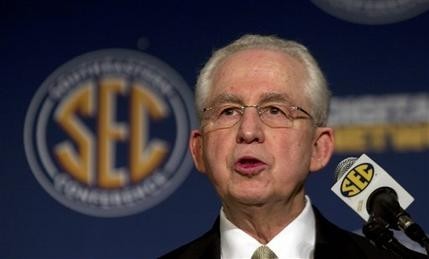HOOVER, ALABAMA -- SEC Commissioner Mike Slive said recent headlines across the country have laid bare the darker side of major college sports so much that they have "lost the benefit of the doubt."
With that in mind, Slive opened Southeastern Conference media days Wednesday by outlining some proposals for change across the NCAA in everything from raising academic requirements for incoming freshmen to paying athletes the full cost of scholarships.
"We don't have the luxury of acting as if it's business as usual," Slive said, noting that he normally would have used that platform to tout recent successes like national titles in football and baseball. "And that's been made clear by the headlines emanating from the Atlantic to the Pacific, and from the Gulf to the Great Lakes.
"As NCAA President Mark Emmert has observed, the events giving rise to these headlines indicate that intercollegiate athletics has lost the benefit of the doubt."
He said the negative perception of big-money college sports resulting from infractions cases from Ohio State to several of his own member schools "casts a shadow over the extraordinary student-athletes throughout the country" and merits change.
It has certainly cast a shadow for years in a league that has captured the last five national football titles, and some more dubious attention.
A day earlier, the NCAA placed LSU on one-year probation for major violations while recruiting a junior college football player. Tennessee and Auburn are waiting on verdicts from investigations, transferring attention from where Slive would ideally have it: On the field.
The SEC is also pushing changes going back to high school, requiring prep athletes to make satisfactory progress in their core courses each year so they don't get caught behind as they near graduation.
Slive also wants an increase of the requirements for initial eligibility from a 2.0 grade-point average to 2.5 in 16 core classes and the restoration of partial qualifiers. Athletes who meet the old criteria but fall short of the new standards would be able to enroll on scholarship and practice but not compete during their first year.
Slive also wants to extend the six-year window for athletes to finish their degree under scholarship.
Arkansas coach Bobby Petrino favors the notions.
"I kind of agree with the thought of let's toughen the college requirements," Petrino said. "Let's make these guys all take the same classes their freshman year. Let's take care of our business in college. I agree a lot with the commissioner, let's find a way to bring them back and get their degrees."
South Carolina's Steve Spurrier used his deadpan style to express his opinion when asked if he favored another SEC proposal of multi-year scholarships.
"No, that's a terrible idea, commissioner," he said. "You sportswriters have a two-year contract? Everybody has to earn their way in life ... Luckily, coaches have 4- or 5-year contracts."
Slive admitted the proposed changes wouldn't be a cure-all.
"It will have some impact. But you know, in all the years we've been doing this and raising standards, kids are competitors and tough and tenacious and they appear to rise to the occasion," Slive said. "To me, the crux of the academic proposals is the high school satisfactory progress. We've just seen too many youngsters who don't wake up until they are juniors or seniors to realize they are talented.
"Now all of a sudden to be eligible they've got to pass all these core courses. That's where some of the problems came from. If you take the 16 core courses and you require a certain number to be passed every year then you force the young person to realize that if he wants to play in the first year he's got to start now."
The SEC also has proposed changes in recruiting rules including removing restrictions on coaches using phone calls, text messaging and social media to contact recruits.
"It's time to push the reset button on the regulatory rules on recruiting in order to move away from the idea that recruiting rules are designed to create a level playing field," Slive said. "There are significant differences between institutions in resources, climate, tradition, history, stadiums and fan interest and many other things that make the idea of a level playing field an illusion. Rules limiting text messaging and phone calls won't alter that."
The presidents at Mississippi State, South Carolina, Georgia and Florida will represent the SEC at an NCAA-sponsored retreat in August. Slive said he hopes that the SEC proposals and other ideas will "establish what might be called a national agenda for change."
Friday
May 17th, 2024
1:27AM









